
Publisher:
Bonnie King
CONTACT:
Newsroom@Salem-news.com
Advertising:
Adsales@Salem-news.com

~Truth~
~Justice~
~Peace~
TJP
Mar-12-2010 18:10

 TweetFollow @OregonNews
TweetFollow @OregonNews
Amy Goodman Interviews the Parents of Rachel Corrie
Amy Goodman Special to Salem-News.comForeword by Tim King.
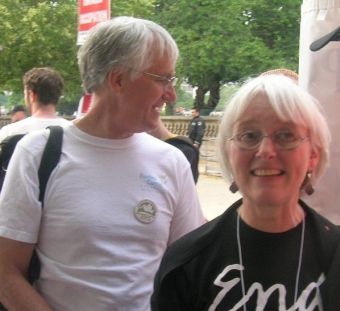 Craig and Cindy Corrie Photo courtesy: en.wikipedia.org |
(HAIFA, Israel) - Rachel Corrie was a college student from Washington state who tried to slow the destruction of Palestinian homes in Gaza. She was run down by an Israeli military bulldozer operator while she communicated with him on a bullhorn.
The Israeli Defense Forces were not held accountable. But, the parents of Rachel Corrie this week, are actually having their day in court. They are currently in Haifa, Israel for the civil case involving the death of their daughter.
Amy Goodman of Democracy Now, talked to Cindy and Craig Corrie; two courageous parents who are trying to find justice in a nation that routinely destroys the homes of Palestinian people in its ever-broadening claim of the tiny amount of remaining Palestinian land.
AMY GOODMAN:
 Amy Goodman |
His comments were released Tuesday after a meeting with Israeli Prime Minister Binyamin Netanyahu, where he reiterated the “unbreakable” ties between Israel and the United States. Biden is scheduled to meet with Palestinian Authority President Mahmoud Abbas in Ramallah today.
This comes as an unusual trial gets underway in Haifa. An American family is suing the state of Israel for the unlawful death of their daughter, Rachel Corrie, a twenty-three-year-old student from Evergreen College in Olympia, Washington. She was crushed to death by an Israeli army bulldozer in Gaza seven years ago. Today, the Haifa District Court in northern Israel will begin hearing evidence from eyewitnesses to Rachel’s death. An earlier internal army investigation exonerated the bulldozer drivers, concluding the soldiers could not see the young American peace activist in front of them. The eyewitness testimony is expected to challenge Israel’s version of events with evidence that she was clearly visible to the soldiers, standing before the bulldozer in her florescent orange jacket.
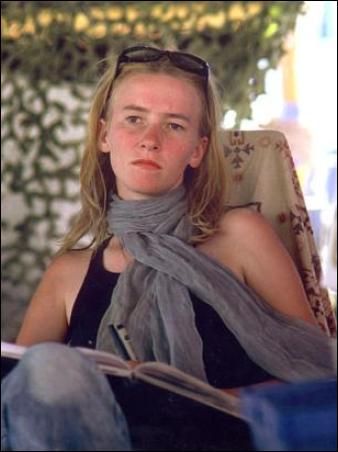
Well, I interviewed Rachel Corrie’s parents, Cindy and Craig Corrie, and her sister, Sarah Simpson, a few days ago, just before they headed to JFK Airport here in New York to go to Israel. I asked Rachel’s mother, Cindy, to go back to those events of March 16, 2003, and explain why Rachel had gone to Gaza to begin with.
CINDY CORRIE: In January of 2003, Rachel went first to the West Bank for training with the International Solidarity Movement. It was a Palestinian-led, nonviolent resistance movement to oppose the occupation and what was happening to Palestinians at the time. That movement was founded because there was a resolution in the United Nations, submitted by the High Commissioner for Human Rights, Mary Robinson, to have a human rights monitoring force in the area after the start of the Second Intifada, when there was so much killing and violence. And that resolution was vetoed by the United States and by Israel. And at that point, ISM was formed.
Some of the co-founders included an Israeli woman, Neta Golan; Americans, Adam Shapiro and Huwaida Arraf; a Palestinian academic, Ghassan Andoni; and others. And Rachel joined that effort. She was trained in Beit Sahour. She had prepared here before she left. She was studying Arabic. She had done a lot of education, and she was beginning to educate our family, because we were new to this issue.
She went—she chose to go to Gaza, to Rafah particularly, because she felt that it was maybe the most forsaken part of the Occupied Territories. It was where she felt her focus and attention was needed. She was there for about seven weeks. She was working, doing a lot of things during the time. Part of what she was doing was writing back and informing us about what she was seeing. And her words have since been incorporated into a play, and her writing from there is in a book of her work.
AMY GOODMAN: Called?
CINDY CORRIE: Called Let Me Stand Alone, published by Norton some years ago. But the play, My Name is Rachel Corrie, is still being seen around the world. Craig and I, just before we came to New York, saw a reading of it in Tacoma, Washington. We went to a performance in Reykjavik, Iceland last year. So it just keeps moving around the world.
But she was working with children and with women’s groups. One of the women in Gaza, when we visited there in 2003, was so happy to show me a note that Rachel had left for her on International Women’s Day. She wanted to connect women in Rafah with women near our community in Olympia. And so, she wanted to start a sister city project between Rafah and Olympia, which people in our community have supported since that time.
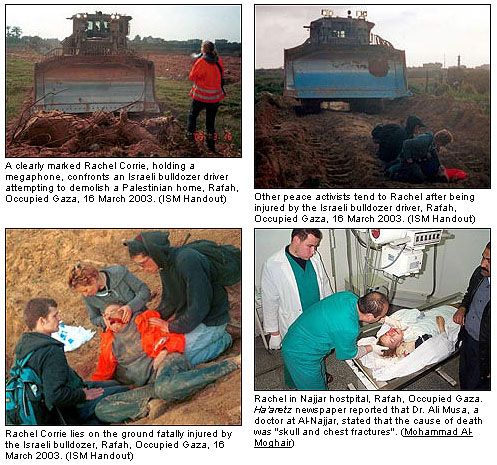
She was opposing—one of the things that she did was to oppose home demolitions, along with the other internationals who were there at the time to support Palestinians. Human Rights Watch reported that between September 2000 and 2004 over 1,700 homes in Rafah were destroyed. It was mass clearing demolitions, is what the Israeli Committee Against House Demolitions tells us. These were not punitive demolitions. Those were occurring in the West Bank for people who were accused of doing some harm to the Israeli citizens through suicide bombings or some other way. But these were clearing demolitions. And the neighborhood where Rachel was staying, it had been a neighborhood with many, many homes at one point. But these were being massively destroyed to clear a buffer zone and to put in a large steel wall, that now largely has come down. But it was standing and was being built at the time we were there in 2003.
The home that Rachel stood in front of that day had two families in it—two brothers, an accountant and a pharmacist, and their five young children. Craig and I have come to know that family. We visit them whenever we go. We have communications with them. Part of the family came to the United States. The Israeli government had nothing against this family. They allowed them to go to Tel Aviv in order to get their visa to come to the United States to travel with us in the year 2005. And yet, their home was destroyed without any, you know, accommodation of any sort and under great threat to the family, as well. It didn’t happen the day Rachel stood there; it happened later that year.
AMY GOODMAN: So, Rachel standing there that day, what did she decide to do? What happened that day?
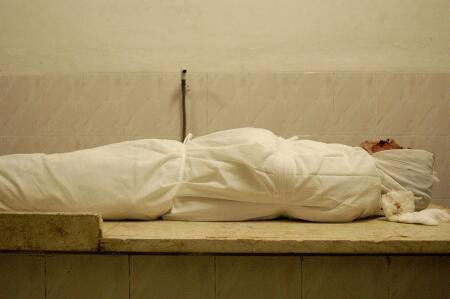
CINDY CORRIE: I think Rachel knew that Reem and Iman, that Kareem, that those children were behind that wall. She had been helping them with their English homework and with their—they were helping her learn Arabic. She had slept at the foot of their parent’s bed, because they couldn’t sleep in their own bedroom because of the shots that would be fired through the wall as Israeli military equipment drove past the house. So she slept at the foot of the family’s—the parents' bed with the other children to offer some international protection to that family.
The bulldozer was coming toward their house, and she knew that the kids and the parents were behind her. I don’t think there’s any way that—you know, I think she also believed that the bulldozer would stop. It had stopped for activists, came right up to them, pushed into them, but stopped at other points during that day. I don’t think she believed this was going to happen to her. But she couldn’t move, because right behind her were these kids and people that she had grown to know and to care for.
AMY GOODMAN: And what do you understand the bulldozer did?
CINDY CORRIE: We have eyewitnesses; seven international eyewitnesses. We have photographic evidence from all of those eyewitnesses that, according to their report—we were able to read the Israeli military report, which happened in Rachel’s case, happens for almost no Palestinians, but there was a—because of US insistence, there was a military police investigation. They indicated, though, they didn’t use the photographic evidence that the ISM'ers had, but anybody looking at those photos can see that what the ISM'ers say is accurate, that the bulldozer proceeded toward Rachel, that she took a position indicating that she was not going to move.
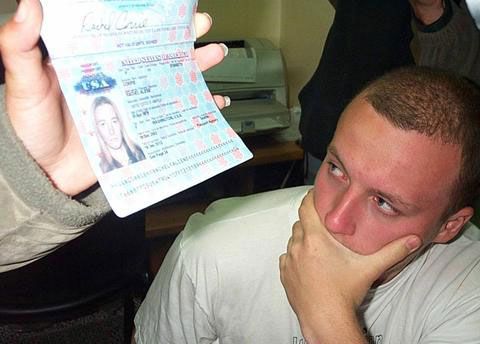
She was in her orange jacket. She, when it kept coming, she rose on the mound, and the eyewitnesses testified that her head rose above the top of the blade of the bulldozer, so she could clearly be seen, but the bulldozer continued and proceeded over her, and so that it was covering her body. It stopped and then reversed, according to the eyewitness testimonies, without lifting its blade, so backed over her once again. Her friends were screaming at the bulldozer drivers through this to stop. They rushed to her, of course, and she said to them, “I think my back is broken.” And those were her final words. And they squeezed her hands and told her that they loved her. And I feel like she had good people with her.
AMY GOODMAN: Cindy Corrie, explaining how her daughter Rachel Corrie was crushed to death by an Israeli army bulldozer while protecting a Palestinian family’s home from demolition in Gaza seven years ago. An Israeli court is now beginning to hear evidence in the Corrie’s lawsuit against Israel for the unlawful death of their daughter, twenty-three-year-old peace activist from Olympia, Washington, Rachel Corrie. The trial begins today in Haifa.
This is Democracy Now! We continue with Rachel’s family—her mother, her father and her sister—in a minute.
AMY GOODMAN: We return now to the family of Rachel Corrie. Seven years after their daughter was crushed to death by an Israeli military bulldozer and five years after filing a civil lawsuit against the Israeli government, the case has moved ahead. Today, a district court in Haifa will begin hearing evidence about the circumstances of Rachel’s death.
On Friday, just before they left for Israel, I sat down with Rachel’s family—her father Craig, her mother Cindy, and her sister Sarah—for an in-depth interview about the case. I asked Rachel’s father Craig to lay out the particulars of the court case.
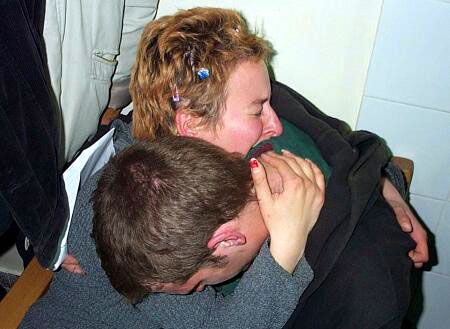
CRAIG CORRIE: This is a culmination, really, of seven years of our family searching for some sort of justice in the killing of Rachel. And we’ve tried to do that through diplomatic means, and we’ve asked for a US-led investigation into Rachel’s killing. We also understand that the Israelis, through Prime Minister Sharon, promised President Bush a thorough, credible and transparent investigation of Rachel’s killing. But, by our own government’s measure, that has not happened. So we’re left with simply a civil lawsuit.
So, we’re accusing the state of Israel of either intentionally killing Rachel or guilty of gross negligence in her killing seven years ago. And so, we’re seeking—the only thing you can seek in a civil case is damages. You know, so it’s really a very small part of the story that’s gone on in our lives. But it’s critical to have our time in court.
Our motivation for that was largely that it is an avenue which we understood we would be able to pursue and get information. So, through the discovery process, we were hoping to get a good deal of information. We have gotten some, but they’ve used sort of secrets of state to keep us, block us, from getting other evidence into court. But we’re going forward, and we’re very hopeful that we will get a fair trial.
AMY GOODMAN: Cindy Corrie, speaking of blocking information, the Palestinian doctor who first treated your daughter, who first treated Rachel, is not being allowed out of Gaza to testify? Is that right?
CINDY CORRIE: That’s our understanding at this point. We were alerted by our attorney, really about a week or so ago, that the Israeli government seemed to be dragging its feet about having our eyewitnesses. We have four international eyewitnesses. There were seven on the scene when Rachel was killed. Four will be coming to testify. Our attorney told us that the Israelis were not agreeing to let them into Israel. We sought help from the US government, from the State Department, and from our ambassador. And subsequently, the four international eyewitnesses have been given approval to come, and they will be entering the same day that we are.
But the doctor, who’s in Gaza, who was with Rachel at the end of her life, or soon after, who administered to her there in Gaza in the hospital, was called as a witness on our side, and the Israeli government has not yet approved entry for him. He also could testify, we hoped, by video conference. That’s what’s been offered, and they have not agreed either to having him come into Israel or to testify by video conference. And we are pursuing that. We know that Ambassador Cunningham has also been pursuing this with Israeli officials.
AMY GOODMAN: The US ambassador to Israel?
CINDY CORRIE: The US ambassador to Israel, yes.
AMY GOODMAN: He’s been pushing for the Palestinian doctor to be able to testify.
CINDY CORRIE: To be able to testify by video conference, yes.
AMY GOODMAN: Sarah, the autopsy of your sister, of Rachel—and I’m still sure that is hard to hear seven years later—can you talk about the significance of that?
SARAH CORRIE SIMPSON: Yes. First of all, when Rachel was first killed, our family really didn’t want to have an autopsy done. It just wasn’t in our beliefs or wishes. And it seemed at the time quite apparent how she was killed, so the necessity of it didn’t seem like it was necessary at that time. But my mother and father were in Congressman Baird’s office and were basically told that the Israelis would refuse to release Rachel’s body back to the United States unless an autopsy was done.
They understood, through the State Department, Congressman Baird, that there was some sort of court proceeding going on in Israel, and there wasn’t a lot of information about that court proceeding. But they were allowed to give a statement of the family’s wishes about the autopsy, and they did a written statement that said the autopsy could only occur if it was done in the presence of a US embassy official and also if it was performed by a civilian doctor. And that was placed in writing and signed and faxed to a Captain Margolin [phon.] with the IDF. And what we didn’t know was that Captain...
AMY GOODMAN: The Israeli Defense Forces.
SARAH CORRIE SIMPSON: The Israeli Defense Forces. And what we didn’t know at the time was that Captain Margolin took that to the Israeli court and submitted it into the court record. And the judge granted the wishes and said that the autopsy could only occur with the US embassy presence and by a civilian doctor. In 2003, my parents were allowed to read the military police report about the investigation into Rachel’s killing. And in that report, it said that a US embassy official was present at the autopsy, so we always assumed that that had happened and had gone as our wishes had stated.
It wasn’t until several years later, through US government FOIA records, that I first saw some mention of the fact that there was no US embassy official present during the autopsy. And it took us until 2007 to confirm with the State Department in writing that absolutely there was no US embassy official present. So that goes against an Israeli court order in terms of the autopsy wishes. So we actually amended our complaint against the government of Israel to bring the violation of the Israeli court order into these proceedings, and information about that will be heard.
AMY GOODMAN: How will this proceed? It starts Wednesday, March 10th, which is actually just six days before the seventh anniversary of Rachel’s death. Cindy?
CINDY CORRIE: Well, I think we have to see how it all unfolds. What we know now is that we will be presenting our witnesses, the witnesses that we have called. That includes Craig, because he can testify to the wishes about the autopsy. It includes the four eyewitnesses. It includes the doctor, Dr. Hiss, who performed the autopsy, and an expert witness who will testify that he believes that the stipulations by which bulldozers are supposed to be used—there are manuals that we obtained through the courts about how the bulldozers are supposed to be used. Those state clearly that when people can’t be dispersed or are in the area, they’re not supposed to operate. And so, the expert witness will testify to a number of things, but he’ll testify about that piece of things. And our witnesses will be presented.
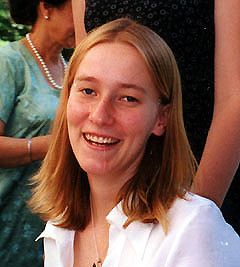
We thought that we would then hear the state’s witnesses, but we just learned last week that, in an unconventional motion, according to our attorneys, the Ministry of Defense applied to not have to submit any of their affidavits to the court—our witnesses had to submit affidavits months ago—but not to have to submit their affidavits to the court and to have thirty days after they hear all of our witnesses testify before their affidavits are submitted. Once that happens, then there will be another court proceeding, apparently, when their witnesses will have to testify and be cross-examined by our attorney. But at this point, we don’t know what that date will be.
The case will be heard by a judge, Judge Gershon, in the Haifa district court. District court there is not equivalent to our district court. This is the court there that falls under their Supreme Court, or their High Court. And our understanding originally was that he would hear the testimony from both sides and then would get final reports from the attorneys in both sides. Following the presentation of evidence, he would then take that and review it, we were told, up to several months and then would come back with a decision about responsibility. And depending on how that turned out, then there would be another phase in which there would be discussion in the court about damage and how parties were damaged.
AMY GOODMAN: Sarah, this is your first time in Israel?
SARAH CORRIE SIMPSON: Yes, it is. It will be my first time in Israel. And honestly, I wish that there would have been a way for me to go without the focus being entirely on the trial, because, you know, I do feel like I need to get a chance to experience a little bit of the culture, meet some of the people. And I’m sure there’ll be some opportunity, but the focus is entirely on the trial at this time, and, you know, it’s a difficult time for our family because of that.
I also—one of my main purposes in going was just, personally, I wanted to be able to hear the IDF’s side of the story. We were asked very early on whether or not we would want to meet any of the military that were involved in killing Rachel, and I’ve always said, “Yes, that’s true.” I’ve told our US government that if given the opportunity to meet the bulldozer driver, that’s something I would want to do. I know it would be very difficult and very challenging, but I think it’s a step that I would have to be open to. And now I feel like it’s been a real violation that in the time that it was set to go to see those soldiers hopefully testify, hopefully they would be called, that that opportunity is not going to be available to me. And I don’t know whether or not I’ll be able to travel back when the government presents its side. So, you know, it’s going to be a challenging time when we’re there.
AMY GOODMAN: Do you know, Craig, if the man who drove the bulldozer will be there?
CRAIG CORRIE: We don’t know that. If he comes, it’ll be because the state calls him as a witness, and that’ll allow our attorney to cross-examine him. And we certainly hope that he comes. As Sarah alludes, I mean, there’s another way to handle some of this. We would like to meet that person.
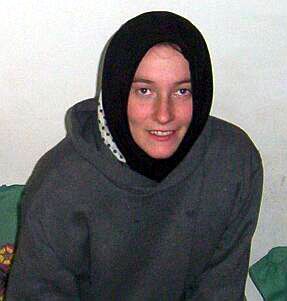
There are lots of victims, Amy, when you look at a war and what happens. And we lost Rachel, and that hurts every day, but that bulldozer driver lost a lot of his humanity when he crushed Rachel. We’re told by B’Tselem, for instance, that in 2004, I believe, the highest—the cause, proportionately, of deaths in the Israeli soldiers, the highest one is suicide. There’s a big toll to soldiers. And I guess I have to hold out my hand, in some way, that if that man could understand what he’s done, in terms of our loss, if he could mourn our loss of Rachel, I could mourn his loss of humanity.
There’s a lot of steps, as Sarah says, that would have to happen that way. But yeah, I’d like to meet him. And it’s not about trying to put him in jail. It doesn’t do me any good if his children don’t have a father, if he has children. But some way, like Desmond Tutu talks about, of mending the tear in society, and I think it’s more like a wound in your arm, and to expect that one half of a wound would heal and the other half stay unhealed is impossible. Both halves have to heal.
AMY GOODMAN: Cindy?
CINDY CORRIE: I think it’s important for people to understand that this lawsuit, as Craig said in the beginning, was just—it’s one step, one piece of what we’ve been doing in the past seven years. And we did pursue answers diplomatically. We worked with the State Department, with—you know, trying to work with the Israeli government to get answers to our questions early on. It was actually in the Department of State quite early that the suggestion was made that we sue the Israeli military and the Israeli government as a way to address this. But it wasn’t—
AMY GOODMAN: The State Department suggested that.
CINDY CORRIE: It was through the State Department that the suggestion initially was made for us to—
AMY GOODMAN: This was during the Bush years.
CINDY CORRIE: This was during the Bush years, yeah.
CRAIG CORRIE: It was. It’s our first meeting within—actually in the State Department in June of 2003, and we were discussing trying to get an independent investigation. And Lawrence B. Wilkerson, Larry Wilkerson, so chief of staff to Colin Powell, turned to me, and he said, “If it was my daughter, I’d sue them. I don’t care about money. I wouldn’t care about anything. I would sue the state of Israel.” And we were surprised—
SARAH CORRIE SIMPSON: And I think that was reiterated.
CRAIG CORRIE: —but ended up doing it.
AMY GOODMAN: Sarah?
SARAH CORRIE SIMPSON: We didn’t file the final lawsuit almost up until the last minute that the statute of limitations would wear out, because we wanted to do this diplomatically. We thought, given the relationship of the United States with Israel, that there was the means to resolve this diplomatically. And no family wants to go through a lawsuit in these kind of matters. And my father and I actually met with Larry Wilkerson in, I believe it was, December 2004, and again that statement of filing a lawsuit was reiterated. And we did file the lawsuit then in the spring of 2005.
AMY GOODMAN: You have lost a lawsuit against Caterpillar—
CINDY CORRIE: Yes.
AMY GOODMAN: —the company that made the tractor that crushed your daughter that the Israeli military used. CINDY CORRIE: Yes, uh-huh.
AMY GOODMAN: What were the grounds of that suit and the rejection of it, the denial of it?
CINDY CORRIE: And that suit was brought in US court and in western Washington. But some people really misunderstand the direction of it. In international law, there is the obligation to hold corporations accountable if they sell their products, continue to sell their products, knowing that human rights violations, a pattern of human rights violations, are occurring with their equipment. And Caterpillar Corporation had been on notice for years that their Caterpillars were being used to harm Palestinians, to destroy their homes, but also to take their lives.
Rachel was not the only person on that lawsuit. There were a number of Palestinian families. I’ve been to the gravesite of a Palestinian family in Nablus. I recognized the name when I was walking through the gravesite of a family, eight family members that were destroyed when their house was demolished with Caterpillar equipment on top of them. It isn’t that Caterpillar sold a piece of equipment, and then something bad happened; it’s that Caterpillar continues to sell the equipment knowing that their equipment is being used for human rights violations.
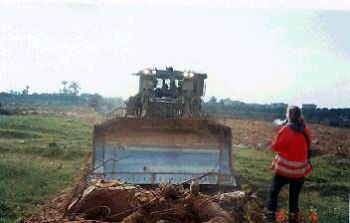
Now, in the—the case was dismissed in western Washington in the district court there but was appealed to the Ninth Circuit Court of Appeals. And in their ruling, the Ninth Circuit Court upheld the decision of the lower court, primarily because the US government entered into the discussion, and there is separation of powers. And the court did not discuss the merits of the case at all, but said that they were cognizant of the fact that—a political question is the legal term for this, but that cognizant of the fact that if they ruled against Caterpillar corporation or address this, that they could be implicating the United States because of its role in funding all of this equipment, so could be—they were cognizant of the fact that they also would be possibly intervening in terms of who has the right to make these decisions within our own government. It’s a separation of powers question.
AMY GOODMAN: You will be going to Israel at the same time as the Vice President. He’s here—he’s in Israel for the week. Now, interestingly, Joe Biden, as senator, raised the question of the death of your daughter. Can you explain the circumstances of this, Cindy Corrie?
CINDY CORRIE: Yes. You know, during the course of the last seven years, our family visited nearly every congressional office, my extended family. And, of course, many constituents brought Rachel’s case before congressional members when we were trying to get a resolution passed for an American investigation, HCR 111. But we visited every congressional office. So President Obama’s office as senator was visited by members of our family also.
AMY GOODMAN: Did you meet with him?
CINDY CORRIE: We have—we talked—Craig asked questions of Obama during the Iowa campaign season. We were in Atlantic, Iowa when he was speaking there. And he knew about Rachel’s case.
AMY GOODMAN: Before, then, I ask about Biden, OK, Craig, what did you ask—
CRAIG CORRIE: Well, actually, it’s a pretty—
AMY GOODMAN: —President-to-be Obama?
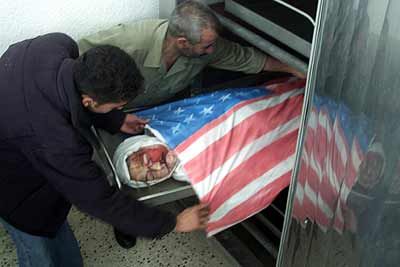
CRAIG CORRIE: Yeah, it was strange, because we were in Atlantic, Iowa, so western part of Iowa, farmland, huge farmland. We’re in county fairgrounds in a cow barn. And I’m sitting on a fence behind the crowd, and the President-to-be Obama is actually asking people for questions, and he called on me.
And so, I ask a very easy question, because I just simply said I have friends in Palestine whose homes are being destroyed, whose farms are being taken from them by the Israelis, with no compensation. And I also have—and it’s true—I have Israeli friends who have lost family members in suicide bombings and stuff. So what could he do to protect the farms of my friends in Palestine and also assure my friends in Israel that there wouldn’t be any more suicide bombings? And then I told him why I was interested in the case and about Rachel’s killing there. And he recognized the name Rachel Corrie. He was familiar with that without an aide or his wife or somebody explaining it to him.
And so, he went on about five minutes talking about what was necessary, and essentially a two-state solution is what he said, for that and giving his commitment to a viable, contiguous state of Palestine alongside a state of Israel, living in peace and dignity and having a future for their people. So it was pretty much a standard US stated foreign policy, not actually the foreign policy we often pursue and enforce, but what we state, and a pretty good answer. And he went on, like I say, for about five minutes. It was very personal.
AMY GOODMAN: So back to Joe Biden. Talk about the questioning—
CINDY CORRIE: Yes.
AMY GOODMAN: —that he did of the—
CINDY CORRIE: Well, it was also during the Iowa campaign, with my Iowa family members. Rachel’s case was brought to his attention in quite a large way. He was asked repeatedly about her case. And he did become interested. He finally said he wanted to see what was going on. And we know—we have copies of questions that he then submitted to Ambassador-Designate—the American ambassador to Israel, James Cunningham, who now is the Israeli ambassador, questions that he asked about Rachel’s case. He asked about what had been done in the State Department and in the embassy in Tel Aviv to pursue a thorough, credible and transparent investigation. And he also asked whether or not they thought that there had been a thorough, credible and transparent investigation. Clearly, getting this is important to officials in the US government.
AMY GOODMAN: And what did James Cunningham answer?
CINDY CORRIE: He laid out the steps that had been taken in pursuit of a transparent investigation and the communications that have occurred between the Department of State and Israel about the case and indicated that they have continued to ask the Israelis to answer questions and to comply with a thorough, credible and transparent investigation.
The communication—one communication that he cited was when Mora Hardy from the State Department went to raise some issues about it, a trip that she made. And we, in a follow-up to that, had a communication from Michelle Bernier-Toth in the State Department, who said that they continue to ask questions and that their questions go either unanswered or ignored by the Israeli government. And what the ambassador assured Biden was that he would continue personally to make sure that a thorough, credible and transparent investigation was pursued. And that was during his—during confirmation in 2008.
AMY GOODMAN: Will you try to meet with Vice President Biden in Israel?
CINDY CORRIE: I think it would be really helpful to us if we could, just to let him know—
AMY GOODMAN: The significance of—
CINDY CORRIE: —the status of it and the significance of it.
AMY GOODMAN: What would be the significance of him showing up in court?
CINDY CORRIE: I don’t think we’re asking for him to show up in court. But I think what we’re wanting—and I know our officials have to walk a very careful line. They can’t appear to be interfering at all in a court process. But I think what we know is that this has continued to be a problem and a matter that US officials do care about. And I think that his meeting with us—and others there, as well, could do that. We do have an invitation to meet with the ambassador. And I think they’re sending that message that this remains a concern to the US government and that they wish to see a fair trial.
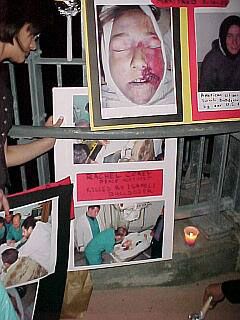
AMY GOODMAN: Cindy Corrie, on the trial that begins today in Haifa in the Corrie family’s lawsuit against Israel over the death of their daughter Rachel, a twenty-three-year-old peace activist from Olympia, Washington. We’ll be back with the conclusion of the conversation in a minute.
AMY GOODMAN: We return now to the final part of my interview with the family of Rachel Corrie, as their civil lawsuit against Israel goes to court today, suing Israel for the unlawful death of their daughter Rachel. Rachel’s father Craig Corrie explained the importance of American officials showing interest in the case.
CRAIG CORRIE: When we’re talking about US officials and US government showing some interest in this case, Congressman Brian Baird, who is our congressman and was the congressman for Rachel when she was killed—and it was his office that we were right after Rachel was killed. He has now written a letter to the judge and is asking that he be able to testify in the case, come to Israel overnight, but he needs that to be—him to be heard on either Sunday the 21st or Monday the 22nd, because, of course, there are votes in Congress and all that. But it’s pretty amazing to me that a US congressman would be willing to take a red-eye to Israel, come and testify, and then pop back onto a red-eye back to Washington, DC. And, you know, my thanks go out to the congressman. I hope he’s allowed to do that. But his willingness to do it is just flooring to me.
AMY GOODMAN: It’s very interesting. He also went to Gaza, right?
CINDY CORRIE: He did.
AMY GOODMAN: Along with Keith Ellison, the congressman.
CRAIG CORRIE: Three times. He just got back, actually, a couple of weeks ago from his third trip to Gaza. And so, you can see, with him, because he’s somebody that we now have, you know, had personal contact with over a number of years. And he got there and saw, you know, worse than what Rachel saw, but he got there and saw it, and it was, as his chief of staff said, life-changing. And you can see that in what he writes and says about it.
AMY GOODMAN: You’ll also be there as Tristan Anderson continues to, well, undergo rehabilitation. He’s in a very serious state, the American citizen who was photographing protests, who was shot by the Israelis. Will you be visiting him? Did you know him?
CINDY CORRIE: We didn’t know Tristan Anderson. Craig and I were in Cairo last year on March 14th, just two days before the sixth anniversary of Rachel’s killing, when we got word about what had happened to Tristan.
AMY GOODMAN: And what exactly happened?

CINDY CORRIE: He was shot with a high-velocity tear gas canister when he was at a demonstration, I believe in Nil’in village. And he has been, you know, in treatment ever since. Very, very seriously injured. I don’t know the status. I hope—we have talked to his parents, and my understanding is that there are still family members there. I know Tristan is still there, and we hope to be able to connect with him when we’re in Israel.
But one of the connections, I think, about accountability for Rachel that I hope others will make is to what’s happened to nonviolent human rights observers and activists, Palestinian, Israeli and international, in the West Bank and elsewhere. There’s been an assault on these people. And it continues. We have friends from—Palestinian friends who were—that we met at demonstrations or we met in Israel in the West Bank, who have made the decision to nonviolently resist what’s happening to their villages with their land being taken, because they believe that’s the best path for their children. And some of those people have been imprisoned in the past year because of their activity in nonviolent efforts. And I think we have to challenge that, and I hope people will be making the connections between what happened to Rachel and that issue.
SARAH CORRIE SIMPSON: I’d just quickly like to point out—
AMY GOODMAN: Sarah?
SARAH CORRIE SIMPSON: One of my frustrations in all the work that we did in Congress was that I think we thought, in the initial days after Rachel was killed, if the US government took a very strong stance against her killing, that perhaps it would have given some more protection to the others—I mean, to US citizens that are traveling in that region. And what we know is that shortly after Rachel was killed, Tom Hurndall, who was a British peace activist, was killed in the same two-mile stretch of Rafah, Gaza. Then there was James Miller, who was a British reporter that was also shot and killed in that same two-mile stretch. On the US side, we had Brian Avery in the West Bank, who was severely injured when he was shot in the face by the IDF. And now we have Tristan Anderson. And some of the frustration was that if there was accountability in Rachel’s case, I wonder how many of those other cases would not have happened.
I do like to point out that in the case of the British citizens, that the British government took a very strong stance against those killings. In the case of Tom Hurndall, they actually managed to get a criminal conviction. And much of that came by the work of the family and the work of the UK government to put pressure on Israel to do a credible investigation. In the case of James Miller, that criminal process did not occur. It was very similar to our case. They closed the case without bringing charges.
But the British government continued to push so that there would be basically a damages claim. I believe that it was about $2.4 or $2.5 million to that family. And I don’t think it’s about the dollar figure, but it’s about saying that there was something very wrong that went on in that case. Iain Hook was another British citizen that they did not get—he was killed, as well, and they did not get a criminal conviction in that case. But again, that damages claim does say that the [UK] government believed that there should be accountability in that case.

And I just think that the US government certainly has the ability to push for the rights of their citizens and the safety of their citizens as hard as the UK government does. And I think both President Obama and Vice President Biden would understand that and want to make sure that the safety of the US citizens that are traveling in Gaza and the West Bank is the highest priority, when we’re over there.
AMY GOODMAN: The anniversary of Rachel’s death will be taking place in the midst of the trial. Trial begins March 10th. Her death occurred on March 16th. What are you calling on people to do?
CINDY CORRIE: We’re calling on people to be visible on March 16th, calling for accountability in Rachel’s case, but also making the linkages between accountability for her and the lack of accountability that’s occurred in—particularly with Gaza, with what happened in Operation Cast Lead in December of 2008 and January of 2009, but really for all of the acts of violence against Palestinians and others in the Occupied Territories.
And we’re also calling for attention to the assault on nonviolent human rights observers and activists that continues in various ways. There are Palestinians, now a growing number of Palestinians, who have died in nonviolent protests to the wall in the West Bank. People can find their names, I think, by going to the International Solidarity Movement website.
AMY GOODMAN: The separation wall.
CINDY CORRIE: The separation wall. And sometimes I read the list of those names. Palestinians resist nonviolently in many different ways. But this is in nonviolent protest to the wall.
And also, I think it’s important for people to make the link between our ability to access the Israeli courts and the fact that Palestinians have really little opportunity to do that. We understand that currently Palestinians who want to operate in the courts or to take their cases to the courts have to put a bond forward of something between twenty and fifty thousand dollars in order to bring a suit. And this is, of course, very prohibitive to them to be able to do that.
B’Tselem and Human Rights Watch and other organizations have talked about the impunity that the Israeli military enjoys because of lack of accountability through the courts and in other ways. And I hope that people will be visible to say, “We’ve had enough of this,” and to call for accountability for Rachel, but to link it to these other larger issues.
CRAIG CORRIE: Amy, one other very specific thing that people could do, and I’m calling for people to do—the US government has come out against the blockade or the continued occupation and siege on Gaza. The children that were behind the wall that Rachel stood in front of are still under a state of siege. And I think that, very specifically, people around the world and certainly in this country could write, call or fax the White House and say, not only should we be working to have the Israelis lift that siege, but if they continue to be unwilling to do so, then the United States should come in there, work out a way that they could come in and—the Berlin airlift, it sent a message to the world about our ability to protect people around the world and our willingness to do so. If we did something similar by sea to the Gaza Strip, it would change the view of Americans around the world for maybe another fifty years. It is something that’s doable, and it’s something that the people out, your fans, could actually physically do and ask the White House to do that.
AMY GOODMAN: I don’t know who wants to take this on, but what did happen to your daughter on March 16th? What do you understand happened?
SARAH CORRIE SIMPSON: My understanding of the case—
AMY GOODMAN: Sarah?
SARAH CORRIE SIMPSON: —you know, after looking at all the evidence that I have seen—and in particular, there’s an IDF video. It’s a still camera that was out on the border that day that filmed the area that Rachel and the activists were in. It did not actually film the incident of her killing. The camera, at the time that she was killed, just happened to pan towards the Egypt border and was focused on the Egypt border away from where Rachel was at the time, and then, after she was hit, quickly panned back around to where she was. And I’ve looked at that video in second-by-second detail, painstakingly trying to figure out exactly what was going on.
After looking at that and other evidence, I am very confident that the bulldozer driver and operator knew that Rachel was in front of that bulldozer as it began to move forward towards her. We know that they did not see Rachel leave that visibility field, because of course she was hit and injured. So she did never leave that visibility.
AMY GOODMAN: What she was wearing?
SARAH CORRIE SIMPSON: She was wearing a red vest, like what you would see a flagger on the side of the road wear, so very obvious red reflective vest. And one of the things was, when I first got that copy of that IDF videotape, the US government requested that tape. It came in very grainy black-and-white footage. Since that time, more recently, an Israeli reporter was able to obtain a color copy of that film. And when you see that color copy, the red vest—there was another activist who was wearing a red vest, as well, and he’s on the scene—it stands out, remarkably, in that color film. There’s no doubt that she would have been visible wearing that vest.
I want to point out about the color copy of the tape, too. In the black-and-white version, it actually does show Rachel standing on the scene prior to her being killed. We know from testimony that the scene that she’s—the place that she’s shown on that video, she actually walks forward slightly, I think about twenty to thirty yards, and she’s actually hit and killed about about twenty and thirty yards in front of where she’s seen on that black-and-white tape. But when the color copy showed up, amazingly, that point at which Rachel was still alive and could be seen, that portion of the tape wasn’t provided to the reporter. It was cut out.
So there is this feeling, when I look at that, that there’s a great attempt to try to depict that Rachel couldn’t be seen on the scene that day. But why aren’t we given the whole copy of the tape? Why wasn’t our US government given the color version of that tape when they repeatedly asked to have the audio transmissions of the bulldozer drivers in their headquarters, as well as the videotape sent to the US government on behalf of our family.
AMY GOODMAN: Are you hoping to get that in this trial?
b>SARAH CORRIE SIMPSON: We already had the discovery process, and we have not been given any further tape. So, at this time, I’m not confident that that would come forth.
AMY GOODMAN: Is that a violation, Cindy, of the judicial process in Israel that, in discovery, you’re not getting what you’re asking for, if it exists?
CINDY CORRIE: Well, I believe that it is. We have asked for the evidence that’s available. And the videotape has been controversial from the beginning. You know, part of it is that the first stories that we got from the Israeli government—I think the first one was that Ed McKeon, who was in the American embassy, said he was told initially that a wall fell on Rachel from a home demolition. And then the story went to “No, we weren’t doing any demolitions that day.”
And then a PowerPoint, taken from this video, was circulated through the United States Congress and shows a picture of the bulldozer with a high mound of earth and says here’s—puts an X where Rachel’s body was and says, “See, she couldn’t be seen.” What we know through—and have been speaking about for some time—through Sarah’s analysis, is that that wasn’t the bulldozer that hit Rachel. There were two bulldozers in the area that day. Each of them had two people inside. There was an armored personnel carrier there, as well, that was supposed to also be looking at what was happening in the area.
But the photo that was circulated to the members of the United States Congress to say to them, from the Israeli officials to the US Congress, “See, she couldn’t be seen,” is false. And so, there’s been a repeated effort that we’ve seen through the years to provide misinformation.
AMY GOODMAN: Rachel’s parents, Cindy and Craig Corrie, and her sister, Sarah Corrie Simpson, on their quest for the truth and accountability for the death of Rachel Corrie. The civil trial begins today in Haifa, Israel. Rachel was killed seven years ago, on March 16th, 2003.
========================================
Special thanks to Democracy Now and Amy Goodman
Articles for March 11, 2010 | Articles for March 12, 2010 | Articles for March 13, 2010
Quick Links
DINING
Willamette UniversityGoudy Commons Cafe
Dine on the Queen
Willamette Queen Sternwheeler
MUST SEE SALEM
Oregon Capitol ToursCapitol History Gateway
Willamette River Ride
Willamette Queen Sternwheeler
Historic Home Tours:
Deepwood Museum
The Bush House
Gaiety Hollow Garden
AUCTIONS - APPRAISALS
Auction Masters & AppraisalsCONSTRUCTION SERVICES
Roofing and ContractingSheridan, Ore.
ONLINE SHOPPING
Special Occasion DressesAdvertise with Salem-News
Contact:AdSales@Salem-News.com

googlec507860f6901db00.html



Terms of Service | Privacy Policy
All comments and messages are approved by people and self promotional links or unacceptable comments are denied.
Bill Levinson March 19, 2010 2:17 pm (Pacific time)
Re: the "peace and justice" issue. War should have become obsolete in the mid-19th century for the reasons cited by Henry Ford somewhat later; industry allows people to create more wealth than they could get by taking their neighbors' land. Land was the principal source of wealth prior to the industrial revolution, because it was the primary means of creating wealth. Industrialization changed this; Japan creates enormous wealth on a resource-poor island. World War II probably didn't have to happen, at least not in the Pacific, because the Japanese could have exchanged manufactured goods for whatever resources they wanted. Germany did not need to invade its neighbors in 1938-1939 because its industries were already creating enormous prosperity. Israel's per-person gross domestic product is much higher than that of oil-rich countries like Saudi Arabia and Iran. This is because Israel's industries create wealth, and the country has no need for its neighbors' land. It took the West Bank and Gaza only after ongoing and repeated provocations and violence from its neighbors. The Arabs on the other hand have enormous amounts of land, but they still think in medieval terms: taking their neighbors' land instead of trying to create wealth through industry. How many Iranians and Iraqis died because Saddam Hussein wanted to take land from his neighbors?
Tim King:Bill, when you refer to 'Arabs' having large amounts of land, I presume you are talking about everyone but the Palestinians. I want to make sure we aren't playing a game here, people could read your words and assume that the Israelis have not taken almost every square mile of land that was once Palestine, and it happened in a very short window of time. There are Arab people all over Israel, but they aren't afforded the same rights as Jews. In the U.S. where we have a free democratic society, that crap would last about three seconds. There are nations that solve problems and there are nations so greedy and driven for their own purposes, that they absolutely and utterly work against themselves. That sounds a lot like Israel. Until the temperment of Israel changes, there is no hope. The authorization of the new settlements so the Orthodox Jews can have 'their own place' and not have to live with Arabs or secular Jews is totally insulting. The very people who cause the most damage through settlement building are the most revered and supposedly most fundamentally religious, just like the Taliban in Afghanistan and Pakistan. I just thank God that there are good people everywhere in Israel who are Jewish and on our side. They are against the oppression, the murder, and the terrible reprisals that all of it has brought on the heads of innocents. Like always Bill, I have plenty to say. I just worry that you are trying to slip things in. Much of what you said made sense did make sense, until the part about Arabs and land. Also, it is very clear that Israeli people have more of a cultural desire to make money, and you somehow think that makes them better? Jews started the whole concept of interest in loaning money. At first they would only charge non-Jews. Muslims were traditionally against the idea of charging interest when making a loan. They have way more of a community sense in these areas. Again for the record, the West Bank, Golan Heights and Gaza are all that remains of Palestine. Everythin else has been taken, along with most of even those areas, all but the Gaza Strip.
Bill Levinson March 17, 2010 10:56 am (Pacific time)
A few more observations: (1) Tim wrote, "The biggest most insulting aspect? Any reference to a snuff film." That's not from my side, it is from a Palestinian journalist who says he wishes not that Rachel hadn't been killed, but that they had had a video camera to film her death--i.e. make a snuff movie. I also note that the ISM took especial pains to photograph Rachel's mutilated body--you have some of the pictures right here--and circulate the photos. I think Israel manages its public relations, or propaganda if you will, very badly. If Israel wanted to play the same game, it could post X-rays of patients whose bodies have been perforated by nails from terrorist suicide bombs. I saw pictures like that once, but they are hard to locate. It could post pictures of the little girl whose head freed terrorist Samir Kuntar smashed with a rifle butt. Perhaps Israel believes, however, that it should follow U.S. journalistic standards that usually keep these kinds of pictures out of the newspapers. (It dates back to the Civil War, when a journalist used one of the new cameras to photograph dead soldiers on a battlefield.) (2) Speaking of pictures, doesn't the fact that the ISM took NO photos of bulldozers actually demolishing houses--even though that was what they said they were protesting against--bother you? That tells me that no such photos were available to be taken because the bulldozers were doing something else. (3) Did it occur to you that "sol goldberg" and "John Doe" might be the same person? That is, he posted the pancake "joke" with an obviously Jewish name and then posted his objections to it under another name? There is no way to prove it but it is a trick straight out of Sun Tzu's Art of War and other books on propaganda. (4) I am well aware of the difference between anti-Zionism (a political movement) and anti-Semitism (hatred of Jews). However, a lot of Arab propaganda is anti-Semitic--e.g. Jews with enormous noses crucifying a woman labeled "Palestine" and then wallowing in her blood, or an Israeli about to bayonet Jesus in his mother's arms; the caption is, "Please do not kill Him AGAIN" (i.e. Jews as Christ-killers).
Tim King: Bill, I actually think you might be a real person, not someone paid by Israel to do this stuff, I hope I am right. Propaganda centering on attributes that are stereotypically related to the Jewish culture are stupid and wrong. I do not and would not do that, I have Jewish friends like anyone else but that isn't why, it is because I am against racist behavior, plain and simple. I am amazed that you reference Matthew Brady's photographs of the American Civil War, do you know very much about that? I do. Brady was the first person in history to deliver the real images of war to the public, and they were published all over the U.S. Brady specialized in photographing the dead because the camera subject needed to hold still for a very long exposure period. Matthew Brady was a war photographer then, I am one today. Things have come a long way since then. You talk about images of Israeli children being hurt and killed, when there are hundreds and hundreds of Gaza's children torn to pieces during Operation Cast Lead (the most insulting name for a military operation ever considering what actually happened. But I guess the Israeli military wanted to create all of that snuff material. I think in fact, that you have nailed this one; maybe the IDF broke international law and flagrantly showed us all how it can get away with this, so that the images would be out there, the IDF snuff films, which you technically could classify every image of OCL to be. This is war propaganda. It is like the guys in VN who cut the ears off the VC and wore them around their necks, only to learn that they crossed a line in doing so that their units would pay for, for years to come. Anyway, the bottom line is that if you push people to a certain point, they will become suicide bombers. You kill a person, and the family takes out several in retaliation. It is just who chooses what weaponry really, but you classify their acts of aggression as crimes, and the rest of the world classifies Israel's acts of aggression as crimes, which they appear to be if you reference factual data.
Bill March 17, 2010 12:40 am (Pacific time)
The links you posted don't work; they apparently changed.
Bill Levinson March 17, 2010 12:39 am (Pacific time)
Tim King wrote, "Anti-Semitism is a cruel label used to bind reporters from ctiticizing Iseraeli policy." Tim, "John Doe" didn't say "Israel" (country) or "Zionist" (political movement), he said "Jew." If he had said, "It doesn't surprise me that Zionists like "sol goldberg" would talk about a "pancake breakfast..." he would have been attacking a political movement as opposed to Judaism. But that is not what he said; he said "A jew like Sol Goldberg." So yes, he deserves the anti-Semitic label--just as somebody who said "A Negro like Barack Obama" instead of "A Democrat like Barack Obama" in a derogatory context would be a racist.
Bill Levinson March 16, 2010 5:00 pm (Pacific time)
John Doe wrote: "It doesn't surprise me that jews like "sol goldberg" would talk about a "pancake breakfast" in her honor because Nazis talked about roast beef lunches 60 years ago in German occuppied Poland, but I digress."
Right: Jooooooooooooz like Sol Goldberg, whose name could be about as real as John Doe. I don't think the pancake jokes are funny either, but it is easy to see the ISM or its friends posting them under Jewish names to promote anti-Semitism. Which seems to be where Mr. Doe is coming from.
Tim King: Again, for those who want to know what anti-Semitism actually means, read this recently published article by esteemed Salem-News.com writer, Author and Professor Jeff Gates: Mar-15-2010: Anti-Semitism - What is it? - Jeff Gates Salem-News.com
Here is another one just published that is by Maidhc Ó Cathail: Mar-14-2010: Anti-Semitism: Zionism's Indispensable Alibi - Maidhc Ó Cathail Salem-News.com
Here is another, just published also, by Alan Hart in London: Mar-14-2010: Anti-Semitism Zionist Myth v Truth and Reality - Alan Hart Salem-News.com
Glad to be able to take this opportunity to educate our readers about how damned inappropriate it is for these people to call us names. Anti-Semitism is a cruel label used to bind reporters from ctiticizing Iseraeli policy. It has absolutely nothing to do with race or religion, only illegal warfare that Israel appears so clearly to be a part of.
donkey March 16, 2010 5:02 am (Pacific time)
I WOULD SUGGEST YOU BLAST THIS AROUND THE WORLD .. SINCE THIS GOES ON EVERY MINUTE NOT JUST IN PALEASTINE I SUGEST YOU POST AND POST AND POST AND FOR THOSE WHO CANT HANDLE SEEING THE GORE WELL I SUGGEST YOU ENJOY YOUR BLOODY STEAK CAUSE ITS COMING SOON MY FELLOW SHEEP.. RP4409 888 DONKEY CLUB
John Doe March 16, 2010 6:36 am (Pacific time)
This is an incredible "interview". Amy Goodman, a Jew with family in Israel, but who holds herself out to be an "American" "journalist" feigns TOTAL ignorance of the facts or procedures of this case, even though this is easily the most famous open murder of an American by Israel since the USS Liberty mass murder. It doesn't surprise me that jews like "sol goldberg" would talk about a "pancake breakfast" in her honor because Nazis talked about roast beef lunches 60 years ago in German occuppied Poland, but I digress. What is most amusing is that these AMERICANS who had their daughter openly murdered by a killer driving an AMERICAN made bulldozer, sued the bulldozer manufacturer in America, but got the case dismissed because the AMERICAN state department stepped in and got the case dismissed to not embarrass the killer's country. So, now the AMERICAN is forced to try her case in the killer's home country, and if she wins, the AMERICAN taxpayer will foot the bill, as always. Compare that to the CONSTANT prosecutions of American citizens of Arab descent and American charities for ALLEGATIONS that they conspired with some unnamed people in Palestine to give aid to homeless children in Palestine, the same kids Corrie was there to protect, and the 60 years sentences given to Americans for their convictions after FOUR repeated prosecutions in American courts for stuff that happened to FOREIGN Jews in occuppied Palestinian land. As long as the "journalists" who cover these stories are Jewish Israelis like Amy Goodman and just about everyone at the New York Times, Washington Post, Time, Newsweek, US News and World Report and every Jewish owned newspaper and media outlet in the US, you will get such travesties as this. Finally, to the Corries, IF you really are interested in convincing us you are serious about this civil suit, then you have to FIGHT to get the defendant murderer driver in court. If he is not there, you don't have a case. We are not all fools.
uncle joe mccarthy March 14, 2010 5:02 pm (Pacific time)
i would suggest that the author immediately redact the photos alledgedly showing corrie's death the first photo was not taken at the time of her death...note the differences in tractors, background and sky dont know how many of you have ever been in an er, but if i had a chest wound, i wouldnt want a doctor twisting my neck and why is it that no news source ever posts this pic? http://www.solomonia.com/blog/images/2008/03/rachel-corrie-flag-02.jpg and the ism is not a peaceful organization they have hidden arms for terrorists and provided them shelter
Tim King: I heard nothing about the ISM hiding the IDF or providing them shelter.
Neeta Lykamen March 14, 2010 11:03 am (Pacific time)
The International Solidarity Movement knowingly and willfully endangered Rachel Corrie's life.
Deceased peace activist Rachel Corrie deserves justice, but her parents Craig and Cindy are looking for it in the wrong place: an Israeli courtroom. They are also calling as witnesses members of the organization whose recklessness (or worse) caused their daughter's death. The indicated link defines reckless endangerment as, a crime consisting of acts that create a substantial risk of serious physical injury to another person. The accused person isn't required to intend the resulting or potential harm, but must have acted in a way that showed a disregard for the foreseeable consequences of the actions. From where we sit, the International Solidarity Movement's decision to allow or encourage Rachel Corrie to kneel in front of a bulldozer after she had almost been killed by one a mere hour earlier constitutes "a disregard for the foreseeable consequences of the action." We also note that the ISM and the Palestinians with whom it was working expressed a motive for wanting Rachel Corrie dead; her death would gain enormous publicity for their cause. We don't think the ISM actually set out to make a snuff film with Rachel as its unwitting star but, when her dangerous form of civil disobedience began to go horribly wrong, it made little or no effort to prevent it from turning out that way.
Tim King: In the view of many, selfless acts are something to respect. I guarantee nobody wanted anyone to die that day, but when you deal with things like an oppressive occupational Army bent on destroying the homes of people who deserve nothing of the sort, bad things happen. The reason? Israel. The fault? Israel The hero? Rachel Corrie. The biggest most insulting aspect? Any reference to a snuff film. If I hear this again then I am going to write a story about the IDF's snuff films which are not a matter of defensive fantasy, but something real. They happened because of perverted greedy sick twisted Israeli soldiers who are empowered to destroy another group of human beings: genocide. Rachel Corrie and her advocates were simply trying to aid families, not a terribly controversial subject in the eyes and opinions of most.
Sol Goldberg March 14, 2010 10:54 am (Pacific time)
This was an actual factual event: The Rachel Corrie Memorial Committee of Victoria Invites you to a pancake breakfast at Denny’s Restaurant Sunday March 12 , 2006 10 am. The Public is invited to a memorial pancake breakfast at Denny’s Restaurant on Douglas Street near Finlayson, 10 am, Sunday March 12, 2006 to celebrate the life and untimely death of Rachel Corrie, Peace Activist with the International Solidarity Movement.
Cindi Aylington March 14, 2010 6:57 am (Pacific time)
The fact is that had she been taken to an Israeli hospital, Rachel would still be alive today. The Arabs had every reason to want to create another martyr.
Tim King: What is wrong with people like you? We offer a comment section and you try to use is to spread false propaganda; cruel lies at that. For the record, Rachel was mortally injured by the bulldozer operator. She had no chance because the Israeli Defense Force soldier killed her.
Jeff Kaye~ March 13, 2010 2:05 pm (Pacific time)
I hope they get a fair hearing with an impartial judge -- something not available to Palestinians -- to highlight the plight of these people trapped like animals in a cage, and a continually shrinking cage, at that. Rachel cared deeply about her cause; to defend the helpless against a monstrous foe. Zionist expansionism is an ugly, hateful policy akin to apartheid and the Nazi Germany extermination campaign targeting anyone not conforming to their bigoted ideals. Why does our country continue to support this lunatic intolerant entity? We need to ask this question of our own government, starting with the president, and on down the line to include every congressperson. We cannot accept evasion, dismissal or continued support for atrocities daily inflicted upon a desperate captive population. Though his comments were rather weak and not nearly condemning or confrontational enough to sway Israeli policy-makers, VP Biden's voiced displeasure with their plans to continue building on stolen land is somewhat encouraging. Let us hope that this courageous young woman with a heart of gold did not die in vain.
gp March 13, 2010 8:42 am (Pacific time)
And good old Zionist David Horowitz says she was a terrorist, her parents are fools and that the Palestinian doctors who were with her when she died are responsible for her death, can you believe how tortured the logic is that allows people to say something like that? People like Horowitz continue to tell lies in order to support the insupportable horror of what is happening and to try to deflect personal guilt.
[Return to Top]©2025 Salem-News.com. All opinions expressed in this article are those of the author and do not necessarily reflect those of Salem-News.com.